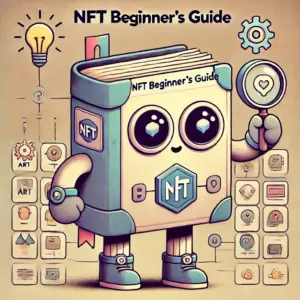While the concept of owning a digital asset may seem novel, the idea of profiting from such ownership is not entirely new. From rare collectibles to exclusive experiences, there have always been avenues for individuals to acquire valuable assets that appreciate in value over time. So, the question remains: is NFT actually profitable?
Table of Contents:
Delving into the Potential Profits of NFTs
The allure of NFTs lies in their inherent scarcity and authenticity, qualities that are often associated with high-value assets. NFTs are unique digital tokens that exist on a blockchain, a secure and transparent ledger that records ownership and transactions. This inherent uniqueness, coupled with the growing popularity of blockchain technology and digital art, has fueled the demand for NFTs and the potential for significant profits.
Case Studies of NFT Success
The headlines of multimillion-dollar NFT sales have undoubtedly captured the public imagination. In 2021, digital artist Beeple sold his artwork “Everydays: The First 5000 Days” for a staggering $69 million, marking a watershed moment for the NFT market. Other noteworthy examples include the Bored Ape Yacht Club (BAYC) collection, whose individual avatars have sold for millions of dollars, and the NBA Top Shot platform, which has generated hundreds of millions of dollars in transactions for collectible basketball highlights.
The Factors Driving NFT Profits
The potential for NFT profits stems from a combination of factors:
- Scarcity and Exclusivity: NFTs are inherently scarce, as each token represents a unique piece of digital content or ownership. This scarcity can drive up demand and prices, especially for highly sought-after collectibles or assets.
- Community and Authenticity: NFTs can create a sense of community and belonging among collectors who share an interest in a particular digital asset or project. This community can drive demand and appreciation for the NFTs, as ownership becomes a badge of honor or membership in an exclusive group.
- Potential for Utility and Engagement: Some NFTs offer additional benefits or utilities beyond mere ownership. For instance, they may grant access to exclusive events, provide voting rights in community governance, or unlock other perks for their holders. This utility can further enhance the value and appeal of NFTs.
Understanding the Risks Associated with NFT Investing
While the potential for NFT profits is undeniable, it’s crucial to acknowledge the inherent risks involved in investing in this nascent and volatile market:
- High Volatility: The NFT market is highly volatile, and prices can fluctuate dramatically in short periods. This volatility poses significant risks for investors, as they may experience significant losses if the value of their NFTs declines.
- Fraud and Scams: The NFT space is relatively unregulated, making it susceptible to fraud and scams. Investors need to exercise caution and thoroughly research projects before making any investments.
- Limited Utility and Adoption: While some NFTs offer utility and engagement, many others lack practical applications or widespread adoption. This limited utility can pose a challenge for investors seeking to recoup their investments.
Exploring the Avenues for NFT Profits
Beyond simply buying and selling NFTs, there are several avenues for generating profits in this domain:
1. Creating Collectible NFTs:
If you have artistic talent or expertise in digital design, you can create your own unique NFTs and sell them on NFT marketplaces. This could include digital artwork, collectibles, or even virtual items for games or metaverse platforms.
2. Curating and Managing NFT Collections:
NFT collectors often seek guidance and assistance in managing their growing collections. You can provide this service by curating collections, advising on investments, or handling the administrative aspects of NFT ownership.
3. Developing NFT-Related Tools and Services:
As the NFT space expands, there’s a growing demand for innovative tools and services to facilitate NFT transactions, management, and valuations. You can tap into this demand by developing software, dApps, or other solutions that enhance the NFT experience.
4. Investing in NFT Infrastructure:
The NFT ecosystem relies on various infrastructure components, such as blockchain networks, marketplaces, and wallets. Investing in these underlying technologies can provide exposure to the growth of the NFT market.
5. Engaging in NFT-Based Marketing and Promotions:
Brands and businesses are increasingly using NFTs for marketing campaigns, promotions, and customer engagement. You can provide services related to designing NFT marketing campaigns, organizing NFT giveaways, or developing NFT-based loyalty programs.
Emerging NFT Trends Shaping the Profit Landscape
As the NFT market matures, new trends are emerging that could further shape the opportunities for profit:
1. Decentralized Autonomous Organizations (DAOs):
DAOs are governance structures powered by blockchain technology, often incorporating NFTs as membership tokens. Profits generated from DAO-backed initiatives can be distributed to NFT holders.
2. Fractionalized NFTs (F-NFTs):
F-NFTs allow ownership of a single NFT to be divided into multiple fractions, making it more accessible and affordable for individuals to invest and potentially profit from valuable assets.
3. Metaverse Integration:
As the metaverse gains traction, NFTs are becoming an integral part of virtual worlds, enabling ownership of digital land, avatars, and other assets with real-world value.
4. NFT-Powered Gamification:
NFTs are revolutionizing gaming by incorporating NFT elements into gameplay, such as collectible items, in-game assets, and even entire virtual worlds. This gamification could drive significant engagement and revenue opportunities.
5. Interoperable NFT Ecosystem:
As NFT standards and protocols evolve, the possibility of interoperable NFTs across different blockchains and platforms emerges. This interoperability could unlock new cross-market opportunities for NFT ownership and trading.
Conclusion: Embracing the Potential of NFTs
NFTs have undoubtedly revolutionized the concept of digital ownership and opened up a new realm of potential profits. While the market remains nascent and volatile, the underlying technology, growing adoption, and innovative applications suggest a promising future for NFTs. By carefully navigating the risks and embracing emerging trends, individuals can position themselves to capitalize on the opportunities presented by this transformative technology. As the NFT landscape continues to evolve, it’s crucial to stay informed, maintain a cautious approach, and focus on long-term value rather than short-term gains. With careful consideration and strategic decision-making, NFTs can hold the key to substantial profits and the potential to redefine the future of digital assets.







